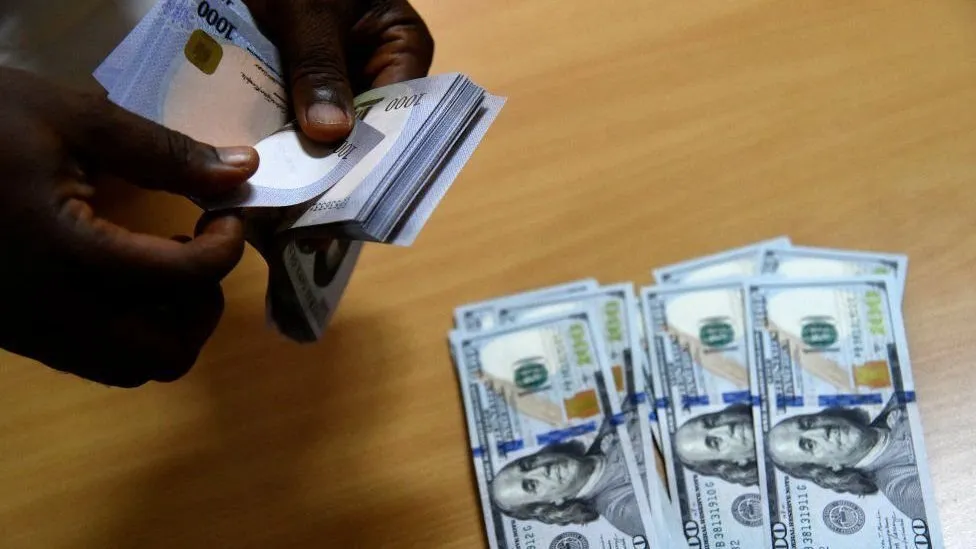Nigeria’s exchange rate concluded June 2024 at N1,503.3 per dollar, showing a slight 1.3% monthly depreciation.
Despite surpassing the psychological threshold of N1,500 per dollar, the exchange rate remained relatively stable, fluctuating between N1,470 and N1,503 in June, staying within a 2% range.
This stability marks the first month of consistent exchange rates since the Central Bank of Nigeria (CBN) implemented significant reforms in the foreign exchange sector.
However, Nigerians have faced prolonged periods of exchange rate volatility, with the naira declining by 40% from December 2023 to June 2024.
At the close of 2023, the exchange rate stood at N907.11 per dollar. It experienced various fluctuations throughout the first half of 2024 and settled at N1,503 per dollar.
Analyzing the Data
The first half of 2024 witnessed considerable fluctuations in Nigeria’s exchange rate, reflecting economic challenges and policy impacts.
In January, volatility was high, starting at N907.11 per dollar and surging to over N1,000 per dollar early in the month. It then stabilized briefly and closed at N1,348.62 per dollar, indicating significant depreciation.
February saw continued escalation, peaking at N1,665.50 per dollar on February 23, the highest for the period, before stabilising towards month-end.
March witnessed a gradual decline, dropping from N1,548.25 per dollar at the start to N1,309.39 by March 28, but it showed signs of recovery towards the end.
April initially stabilized, with the exchange rate fluctuating between N1,136 and N1,339, but ended the month at N1,419.11 per dollar.
May continued the fluctuation trend, ranging between N1,354 and N1,533, concluding at N1,485.99 per dollar, indicating ongoing volatility.
June, however, brought relative stability, with the exchange rate hovering between N1,473 and N1,510, closing the month at N1,505.30 per dollar, a 1.3% decrease from the previous month.
This relative stability in June suggests that the CBN’s reforms may be starting to stabilize the foreign exchange market despite earlier volatility.
CBN Policies in H1 2024
Over the past year, the CBN unified all forex market segments and introduced multiple reforms to boost forex supply and ease demand restrictions.
In the last six months alone, the CBN issued over 15 circulars and implemented policies to liberalise the market further.
To preserve forex reserves and support the naira, the CBN adjusted operations for International Money Transfer Operators (IMTOs), restricting them to inbound transfers with mandatory Naira payouts. This affected major operators like Western Union and MoneyGram.
The CBN also tightened regulations on Bureau De Change (BDC) transactions, particularly for education and medical expenses abroad. Additionally, the apex bank intervened in the forex market at least four times in H1 2024 and cleared the outstanding FX backlog.
Further measures included addressing suspected currency speculation and hoarding cases by Nigerian banks, mandating them to sell excess dollar reserves by February 1, 2024, to stabilize the volatile exchange rate.
Another significant circular removed limits on the spread between buy and sell rates in interbank forex transactions and eased restrictions on the sale of proceeds from these transactions.
Additionally, the CBN adjusted guidelines for international oil and gas companies, limiting the cash pooling of forex inflows and allowing them to sell only 50% of their repatriated export proceeds to authorized dealers.
The 40% depreciation in the first half of 2024 indicates lingering market scepticism regarding the effectiveness of these policies.
Key Insights
Despite these efforts, the Nigerian Autonomous Foreign Exchange Market (NAFEM) is poised to record its lowest FX turnover in five months by June 2024, underscoring continued dollar scarcity and pressure on the naira.
The persistent depreciation and reduced FX turnover highlight significant liquidity challenges in Nigeria’s economy.
On a positive note, Nigeria’s foreign reserves surged to $34.07 billion by June 26, 2024, the highest in over three months, attributed partly to reduced CBN intervention and increased crude oil exports.
While these developments aim to stabilize the market and attract foreign investors, FX liquidity remains a critical issue, driving ongoing local currency depreciation.











